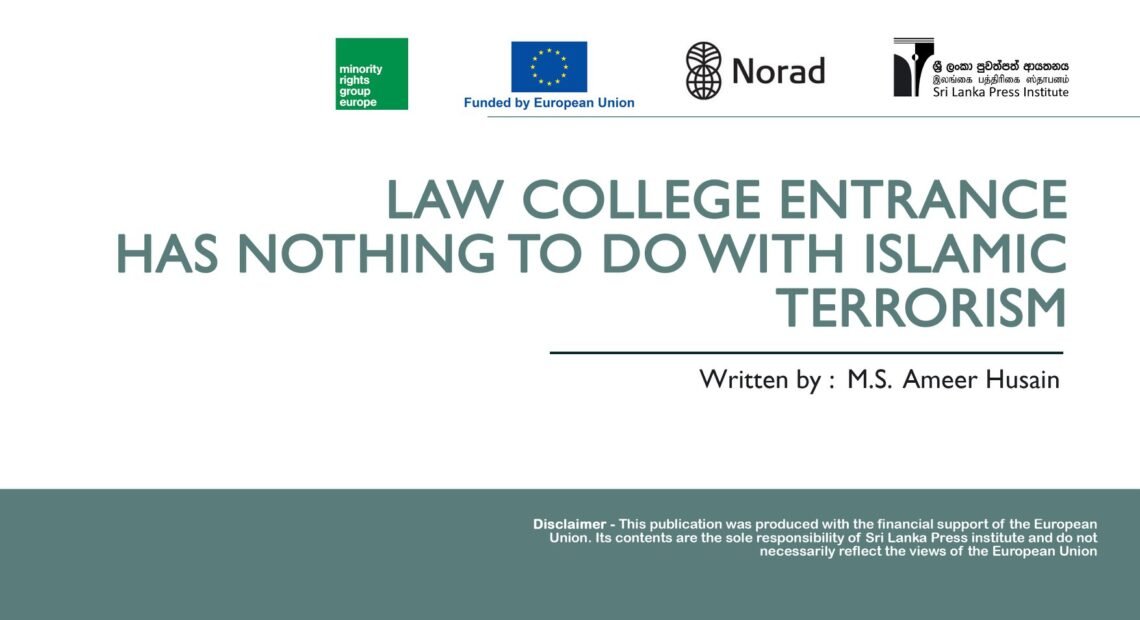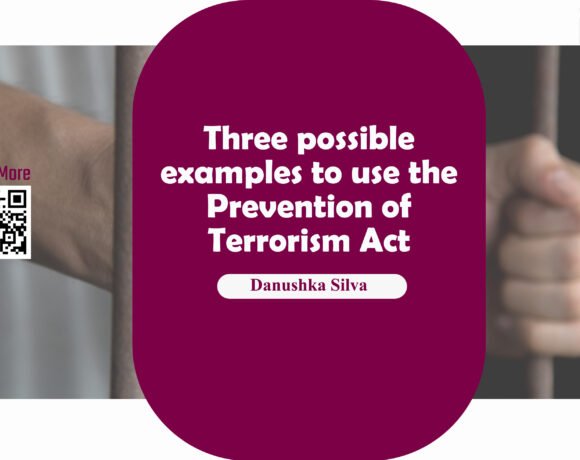
Law College entrance has nothing to do with Islamic terrorism
M.S Amir Hussain
Former Senior Deputy Inspector General of Police (DIG) NilanthaJayawardena has said that the number of Muslim students being selected for the Sri Lanka Law College is on the rise and has a far-reaching and planned background. An English newspaper recently quoted him as saying the above in the presence of the Presidential Commission of Inquiry into the April attacks. In his opinion, the purpose of entering the law college was to capture higher positions in the most important departments of the country and he wanted this to be investigated.
A kind of skepticism about the Muslim community has been unleashed since the suicide bombings on April 21, 2019. The fact that this information is aimed at the Muslim community living in Sri Lanka and a national media outlet in its newspaper giving prominence to such an opinion expressed by a high ranking official without any basis or evidence should be seen as an act of contempt for the true quality of journalism.
It is true that Section 14 (1) (1) of the constitution relating to the fundamental rights affirms the right to speech, writing and expression. But to offend the feelings of a community and the people belonging to that community with the publication of a claim that has no basis in a way to mislead and to incite the majority community against that particular minority community is a grave act.
The Muslim community in Sri Lanka has been showing interest in the legal field since the inception of the Law College. For example, famous justices like Justice Akbar, ALM Hashim, H.G. Amin had been prominent among many other lawyers, though a large number of Muslim students were not interested in studying law in the initial stages.
The reason for not choosing this field could categorized as: High cost of studies since the Law College is located in the capital, many students from outlying districts were reluctant to come to Colombo for education, and also the reactionary thinking that legal education (is against Islamic norms to defend criminals and wrongdoers by lying and arguing skills) is unethical were some of the factors for the less number of Muslim students showing interest in the legal field.
However, there has been a renaissance in education among the Sri Lankan Muslim community since the year 2000. Expansion of International Colleges, English medium teaching in Muslim schools, interest in academic disciplines, increased facilities and opportunities for higher education could be cited as some of the reasons for Muslim students to becoming interested in new fields; and also due to factor that increased intellectual awareness in the Muslim community.
Above all, Muslims of Sri Lanka have been a community with a history of 1200 years and the status quo of being a mere trading community for so long has changed and the level of interest in knowledge seeking has increased in the post-19th century.
Out of 4.4 million students in the country, there are just over 800,000 students who belong to the Muslim community. After the GCE (A.L.) examinations a substantial number of these students are interested in higher education. They also appear for the Law College entrance examination. Out of thousands of students, less than 200 are selected each year.
The senior superintendent of police said that 03 Muslim students were selected for the law college in 2003 and the number increased to 78 in 2012. Since there was a sudden increase, it is suspected that there was an Islamic fundamentalist or terrorist background.
According to this, does the Muslim community not have the same right to education as other ethnic groups living in Sri Lanka? The right to education is a fundamental right guaranteed by the Constitution of Sri Lanka.
So can the Muslim community be denied the right to enjoy the right to education provided by the constitution of Sri Lanka on the basis of being a different community living in this country?Denying the right to education to Muslims by claiming that it is terrorism or Islamic fundamentalism, is an act that violates the fundamental right of Muslims.
Muslims are educated and shine in various fields including law, medicine, engineering, science and accountancy. Can’t Muslims enjoy that right in the country? Is it a crime?
Following the July violence against Tamils unleashed in the country in 1983, Tamils living in the North East were branded as terrorists and removed from many high positions.As a result, thousands of intellectuals from the Tamil community emigrated abroad. Similarly Muslims too are now viewed with suspicion.
Students are selected for the Law College on the basis of a limited, government-approved competitive examination.The students who get the highest marks in the examination conducted by the Law College are then selected for the College.Students gain admission because of their ability and talents. Students who are thus selected have no other background reasons other than the sole ambition of studying law and becoming the best lawyers in the country.
Releasing unsubstantiated allegations and resorting to racial slurs is the result of jealousy that Muslim students become lawyers. Such actions should be strongly condemned. There is a good demand in today’s media for news or information that leads to such racial conflicts and suspicions.
The reason is to incite hostile sentiments of the majority Sinhalese people, the rulers and officials against the Muslims in the country and to nurture suspicions about the particular community.
The media should not violate social responsibility under any circumstances is a lesson taught by the Media Code of Ethics.The media, which acts as a tool for publishing information, should not violate its moral responsibility towards the society. The media needs to be more vigilant in releasing information that could raise racial suspicions that could lead to racial conflicts.







